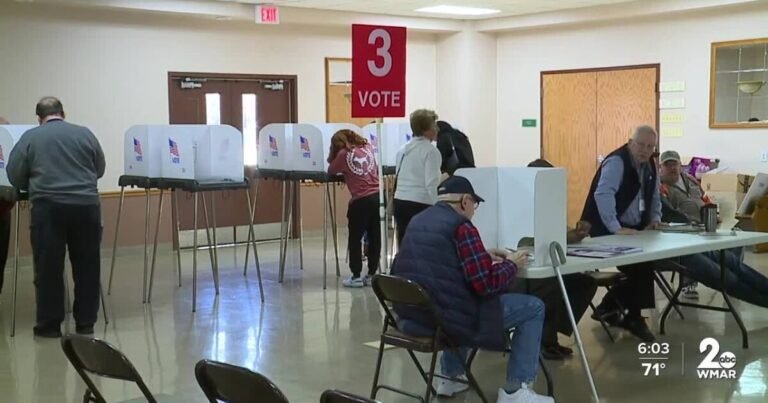BALTIMORE — A group of everyday Maryland voters, some of whom are computer scientists and statisticians, combed through the past three years of data from the Maryland State Board of Elections.
“There appear to be a lot of errors in the voter rolls,” said Ed Hartman, an attorney with Maryland Election Integrity LLC.
The group claims to have found tens of thousands of errors in both its voter registration database and vote counts for the 2020 and 2022 general elections.
Current number of clear registration violations: 79,349 Voting violations in the 2020 general election: 62,075 Voting violations in the 2022 general election: 27,623
They submitted the data to the Election Commission, but when they received no response, they filed a civil lawsuit in federal court. Annapolis-based attorney Ed Hartman is representing them.
In his lawsuit, Hartman alleges that the Federal Election Commission sets a “maximum margin of error” for voting systems. [all] The system must ensure that the total error rate for reports does not exceed 1 in 125,000. ”
He calculated that in the 2020 election, with 3 million voters, the maximum allowed error was about 24, and in the 2022 election, with about 2 million voters, the maximum allowed error was about 16. It was a matter.
“The law only allows for a handful of mistakes.”[…]And since we have tens of thousands of them, a scale beyond what federal law allows is unfortunately easily established. And our goal is not to retroactively attack what happened. Our goal is to move forward and wipe out. ”
The group of voters forms an LLC called Maryland Election Integrity. Hartman said they sought him out because of a 2022 legal battle over whether election officials can start counting mail-in ballots early to avoid delays during primaries. He said it was probably because he knew he was representing gubernatorial candidate Dan Cox. Cox’s efforts ultimately failed.
Maryland Election Integrity LLC is also joined in the lawsuit by another entity called United Sovereign Americans Inc., based in Missouri. The group says it is preparing to file lawsuits in 23 states, including Maryland. Chairman Harry Hawley’s website bio states, “He became directly involved in analyzing the electoral system after the 2020 election and was the first to advocate for a focus on apparent large-scale election fraud.” it is written like this. He submitted expert testimony in several 2020 election challenges, including testimony submitted to the Supreme Court. ”
Asked whether he was concerned that people would automatically disagree with the premise of the case because of its association with such a politically polarizing case, Hartman said: stated. The media and their intense feelings towards him continue. Unfortunately, it covers a whole lot of things, and I think I’m probably being painted with that brush in some way because I’m his agent. But this has nothing to do with Cox, Trump or past elections. ”
“We’re not going to go back and say we lost a particular election because of this. We don’t know and we’re not going to go down that path. It’s too late and it’s far too late. It will be a very difficult process.” […] What we’re saying is we’re trying to catch it early so no one is worried. “Maybe then we can stop debating whether the election was rigged,” Hartman said.
In response to the lawsuit, Joanne Antoine, executive director of the advocacy group Common Cause Maryland, said: “One of these organizations was incorporated in Missouri. The other was founded by a lawyer in South Carolina. Here’s everything you need to know about their concerns about Maryland elections. You’ll understand. Maryland has some of the most secure elections in the nation. Common Cause Maryland and its partners are committed to improving post-election processes, learning from rare voting machine errors, and improving election administration. We have worked hard over the past several decades to establish trust between people and the communities they serve, and this lawsuit is an attempt to cast doubt on the work we have done. We stand with election boards and election officials across the state and hope that this lawsuit will be quickly dismissed by the court.”
Mr. Hartman replied: “That’s not what we want to say. We’re not going to go back in time and blame anyone. We’re not here to point fingers. We’re not calling anyone a villain. That’s not what we want to say. What we want to do is bring this system into compliance so that people can trust it. Just bring it back. I’m sure everyone wants that. I don’t know why. There’s no argument to be made to say it’s a bad idea to make sure your election system complies with federal and state laws. We need to have a conversation that goes far beyond that. We want that, and that’s what anyone running for office wants.”
The Maryland Attorney General’s Office confirmed it is representing the State Board of Elections in the case, but declined further comment.
In October 2023, a state audit found several problems with the Election Commission’s procedures, particularly the identification and removal of deceased and duplicate voters from the rolls.
The State Board of Elections (SBE) disputed most of the findings, claiming they were inaccurate, mischaracterized, or representative of a small portion of the voter record. However, officials agreed to work on improving procedures. The agency noted that an independent oversight review of ballot database programming and distribution will be established in February 2023 and will be used in all future elections. Following the audit’s recommendations, changes were also made to local election boards’ oversight processes to ensure that identified errors are corrected in a timely manner.
As part of its response, SBE wrote: “SBE agrees with enhanced procedures for identifying deceased and duplicate voters, but maintains that the current process is comprehensive and effective, and supports OLA’s characterization and discussion note of the current process. The numbers point out that the numbers are significant and have been mischaracterized. Additionally, the manual reviews required to strengthen procedures will require additional staff given the department’s current workload. ”
SBE23 by Rushaad Hayward on Scribd

